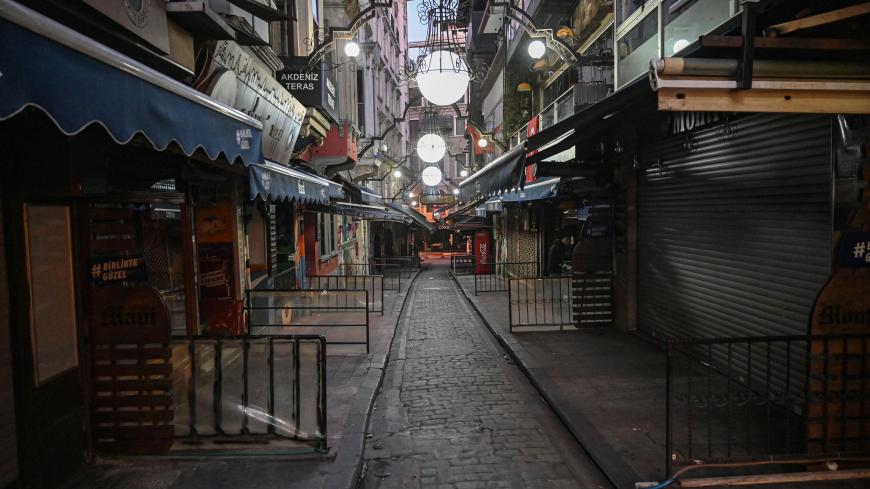Walking into Musterek Meyhane, one is immediately struck by the warmth of the place.
This modern yet classic take on the classic meyhane — a taverna serving the anise-liquor raki and the appetizers that accompany it — is filled with nostalgic portraits, houseplants and smiling waitstaff. If you are a regular of this Istanbul institution, the workers will greet you by name. Musterek has such a loyal customer base that one often has to reserve a table several days in advance.
Despite this popularity, the place has a human touch. It is not for nothing the owners named it Musterek, an Ottoman word related to the terms for “the commons” and “collective.”
Today, however, the meyhane sits empty. Musterek is one of many Istanbul nightlife establishments that has closed its doors due to the coronavirus. As of March 19, the Turkish Ministry of Health has confirmed 191 cases of the coronavirus and three deaths. Hoping to slow the spread of the virus, the Interior Ministry declared March 15 all bars and nightclubs across Turkey’s 81 provinces temporarily closed, effective 10 a.m. the next morning.
On March 16, a second announcement closed music venues, cinemas, theaters, most restaurants, as well as internet cafes, amusement parks, pools, saunas and gyms.
After the Interior Ministry’s decision, the normally packed streets of Taksim and Kadikoy are almost unrecognizable. No revelers sit smoking and conversing at outside tables. The bars and venue spaces are shuttered. At certain times of the day, the only signs of life are the occasional stray dog and the lone person passing by wearing a surgical mask.
Emre Suvari, who has been working in the restaurant sector for 20 years, is worried. He helps run Musterek and is a partner at two newly opened drinking spots a stone’s throw away.
“For years, establishments in the nightlife sector have been struggling, especially if they are not luxurious places with rich clientele. Most have problems with rising costs, especially alcohol,” Suvari told Al-Monitor.
A 70 cc bottle of raki commonly served to customers at Musterek is 72% tax. Due to increases in Turkeys’ special consumption tax, the price of a bottle has risen from 8.25 Turkish liras in 2002 ($1.26 at the current exchange rate) to 152.50 liras ($23.40) in 2020.
While Suvari agrees that businesses need to temporarily close, he objected to how initially only establishments that served alcohol were named.
“The memorandum referred to ‘places of recreation and entertainment’ but singled out bars, pavilions, discotheques and nightclubs. I find this decision incomplete, wrong and political.”
The Interior Ministry subsequently decided to close restaurants and cafes, including the traditionally all-male tea houses that more conservative citizens often frequent.
Suvari said the situation of the waitstaff is even more precarious than the owners of bars and restaurants.
“Most people in the sector have no health insurance and earn money through tips. Even if the establishments manage to stay afloat, this period will be difficult for workers without other forms of support.”
How the virus that causes COVID-19 will affect the Turkish economy is a hot-button issue. On March 18, President Recep Tayyip Erdogan announced a stimulus package worth 100 billion liras ($15.3 billion). The plan defers social security premiums for six months in the entertainment and hospitality sectors, as well as in the food and beverage, automotive, steel and other industries.
Yet the plan has been critiqued for ignoring workers, particularly those in the service sector. In a recent article, Haberturk writer Fatih Altayli asked, “Couldn’t 4-5 months of salary have been secured for businesses out of an unemployment fund and save workers from being fired?”
Many service workers risk losing their jobs while bars and restaurants are closed. As for those who remain ostensibly employed, it is unclear when or even if their workplaces will reopen. Experts on the American restaurant industry, for example, suggest that most establishments will not survive the pandemic unless the government bails them out. The situation is even more volatile in Turkey.
Musicians are another subset of workers in Turkey’s entertainment and nightlife sector who face a tough road ahead. They make the better part of their livelihood through concerts and so are dependent on bars and other performance spaces.
Even before the Interior Ministry decision, many of Istanbul’s major concert halls recognized that the situation was untenable. On March 13, the venue Babylon declared all events postponed until at least April 6. Salon IKSV and Zorlu PSM also suspended their concert programs as a precaution.
When a venue closes its doors, security guards, bartenders, sound technicians, cleaners, roadies and of course musicians all find themselves out of work.
ELZ, one such musician, plays in an up-and-coming musical project out of Istanbul called ELZ AND THE CULT, which performs a style of music known as darkwave or post-punk inspired by the goth subculture and synth-heavy bands of the 1980s.
On March 11, ELZ and bandmates played a concert in Hamburg. For the second stop of their mini-tour of Germany, they drove to Berlin. On the way, they got word that their upcoming shows were canceled, including several dates in Istanbul.
“Right now, I have four months of canceled work ahead of me,” ELZ told Al-Monitor.
Their concert planned for March 20 at Salon IKSV was part of the monthlong, multi-venue Jam Session festival. The whole series has been postponed, leaving ELZ and others without the income brought in by live performances.
“Fans need to know that most of us don’t have side jobs that would pay us when we stay home during a health crisis. The cancellations have already affected me and most of my peers very badly,” ELZ said.
With similar problems facing musicians in China, Italy, New York and beyond, some are attempting to throw musicians a lifeline. Online music platform Bandcamp temporarily waived its commission on music and merchandise.
Fans are also encouraging their favorite bands to perform concerts at home and stream them digitally. A popular Facebook group called Corona Concerts tracks these events. On March 15, Turkish musician Haluk Levent followed suit with a live-streamed event dubbed the “Morale Concert.” It was watched by 699,000 people. Indie musicians like Nova Norda have used also Instagram to play for fans and answer their questions.
Yet what musicians most direly need, ELZ argued, is cash.
“While I understand this is a global problem and most of us are going through the same thing, I need people to empathize and support musicians/artists as much as possible. Turkey is a country that streams or illegally downloads its music online. No one is expecting people to pay us great amounts of money, but even the littlest things count. Buy your favorite bands' merchandise and music. If you can't, send them a little message to show your support. I think some hard days are awaiting us economically, but we might come together and find solutions.”
Suvari has a similar perspective on Turkey’s drinking establishments. “I think this is going to be one of the hardest periods we go through. I invite all businesses to stand with vulnerable workers. It is only with solidarity that we will get through this,” he said.







